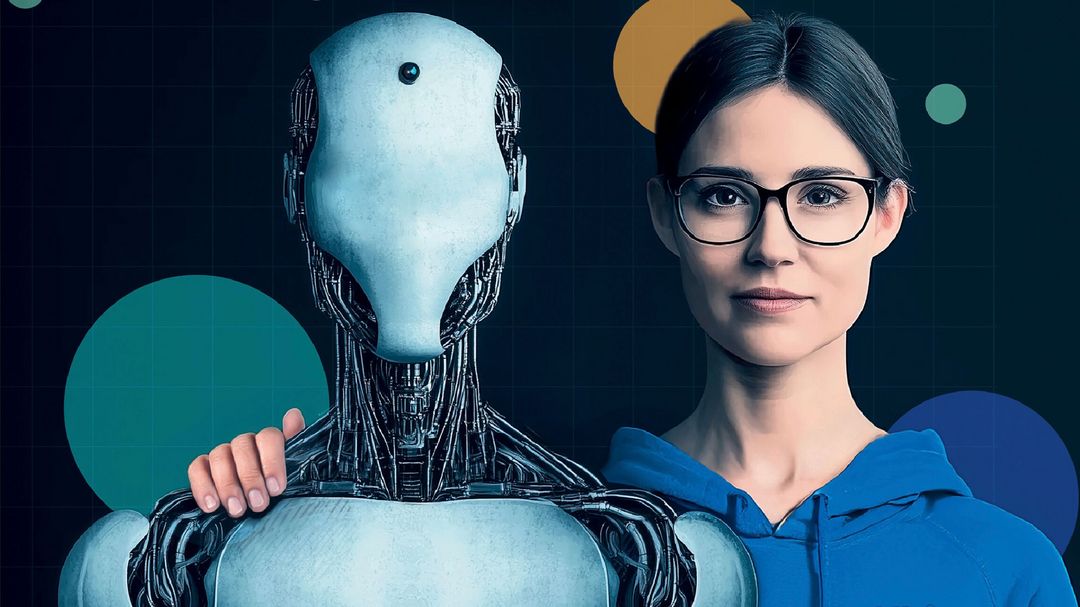
Twinned AI, Trusted AI, and Sustainable AI – The new fields of innovation
| Environment & Energy | IT Security | Agents and Simulated Reality | Intelligent Networks | Cognitive Assistants | Robotics Innovation Center | Smart Data & Knowledge Services | Systems AI for Robot Learning

Twinned AI - Artificial intelligence for the digital twin
For the first time since the breakthrough in generative AI, artificial intelligence has been able to generate creative content. This development is based on very large data collections and deep neural networks, particularly large language models (LLM). In principle, robots have the ability to access the entire knowledge of an LLM and use it to generate actions. In the digital twin – a virtual representation of the physical world constructed on available data – the robot's virtual alter ego can already act and move autonomously.
What is still absent in AI's ability to transfer this to action in the real world is the enrichment of the digital twin with the dynamic data from the physical environment and a concept with which the robot can harmonize its knowledge of the world from the LLM with the awareness of its current environment.
The Twinned AI innovation field at DFKI now aims to achieve this by placing robots in the physical world and enabling them to act context-adaptive. Robots oriented in this way could be used wherever they interact with humans, i.e., in unstructured environments with changing parameters, such as everyday assistance or caregiving situations.
In an industrial setting, Twinned AI offers the opportunity to open up manufacturing to a large extent for human-robot collaboration. The end vision is of a future factory designed as a neutral platform on which any product can be manufactured with robotic support.
Trusted AI - Trustworthy AI as the foundation for innovation
The expanding integration of AI into major sectors of the economy and society requires robust mechanisms to ensure acceptance and trust. Adjectives such as reliable, transparent, fair, robust, inclusive, and ethically responsible are the measures used to describe the basis for trustworthy AI systems. Researchers at DFKI are working with industry, science, and government to apply these measures to define clear test criteria for AI systems. These criteria then serve as the means to guarantee the development of trustworthy systems. The aim is to create the foundation for solid trust in the use of AI, i.e., technological innovation with social responsibility.
Trustworthy AI is a priority of DFKI’s MISSION KI project and also the focus of the CERTAIN initiative (Center for European Research in Trusted AI).
MISSION KI supports the development of uniform testing and certification methods for AI applications and systems. In collaboration with partners such as TÜV (English: Technical Inspection Association), the project helps to define transparency, reliability, and ethical responsibility. The output serves as a basis for regulatory requirements and offers economic security for domestic AI companies.
CERTAIN develops and promotes new technology standards and AI governance that guarantee AI systems will act reliably, safely, and ethically. As a collective European initiative, CERTAIN brings together various efforts and stakeholders from research, industry, administrative, and public organizations.
DFKI Darmstadt focuses on AI safety for large AI models such as LLMs. Research focuses on how unintentional damage caused by AI systems can be prevented using targeted methods and frameworks. This creates the basis for robust and safe AI applications.
DFKI's bundled approach makes a decisive contribution to the future development of powerful and understandable AI technologies and ensures their safe and responsible use.
Sustainable AI - Innovation meets responsibility
Twinned AI and Trusted AI require powerful and constantly growing foundation models that inevitably go hand in hand with increasing energy needs. Sustainable AI is dedicated to the question of how AI systems can become more resource-efficient and contribute to sustainable economic development.
The industry lacks standardized tools to make the technology's impact transparent and measurable, making reconciling AI innovation with ecological and social goals difficult.
DFKI takes on this challenge with the DFKI4Planet Competence Center, which is committed to sustainable AI solutions. This is not only about sustainable applications but also about the sustainability of AI itself. AI must be measurable, fair, and resource-efficient. DFKI is developing the tools necessary to evaluate the energy consumption, emissions, and resource consumption of AI technologies. These tools provide decision-making aids that help companies benefit from the sustainable and efficient use of AI.
Sustainability becomes a driver of innovation while ensuring long-term competitiveness and future viability. Companies that use sustainable AI solutions reduce costs, meet legal requirements, and position themselves as pioneers for responsible technologies.
Holistic development of AI innovation through networked fields
The further development of artificial intelligence relies on taking a comprehensive approach based on the close relationship among these three innovation streams: Twinned AI, Trusted AI, and Sustainable AI. The combination of physical integration, trustworthiness, and sustainability not only creates technological added value but also enables the responsible design of future AI systems to meet the needs of society.
Downloads:
Press contact:
Reinhard Karger, M.A.
- Reinhard.Karger@dfki.de
- Phone: +49 681 85775 5253